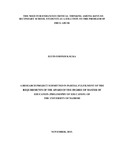| dc.description.abstract | This research project sought to philosophically investigate the role of inherent capacity of
a student to think critically as a possible solution to drug abuse among Kenyan secondary
school students. The study uses the analytical method alongside the Cartesian methodic
doubt in examining the student as an inherent critical thinker, the inefficiencies of current
solutions to menace of drug abuse and in proposing a better way out of drug abuse. It has
been the undertaking of this research to argue that since all human beings are endowed
with the rational capacity they are ontologically free beings. Given that secondary school
students are human beings and given that they have the capacity to think critically, they
are ontologically free.
The research project found out that the solution to drug abuse is not to be found outside
the drug abuser but in provocation of the actual and the potential abuser’s mind to think
critically. The first cause of drug abuse has been observed in this study to be the
perversion of curiosity and therefore the solution to the problem should be based on
addressing ‘incorrect thinking’ through pedagogies that seriously promote critical
thinking. It is the opinion of this researcher that if critical pedagogy is used over a period
of time there will be no need of talking about drug supply since the probable consumers
will have developed the capacity to question themselves and others before taking the
illicit drugs. The students who undergo serious training in critical thinking are in
themselves a solution to drug abuse. Thus drug abuse is not a drug problem but a human
problem.
This study offers two recommendations necessary for the prevention of drug abuse among
Kenyan secondary school students:
First, training and in servicing teachers in critical pedagogy and critical thinking should
be undertaken by bodies responsible for teacher education.
Secondly, the content and method in educating teenagers in secondary schools should in
themselves be oriented towards making learners critical thinkers. | en_US |

